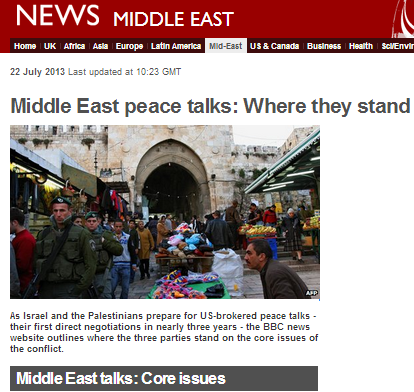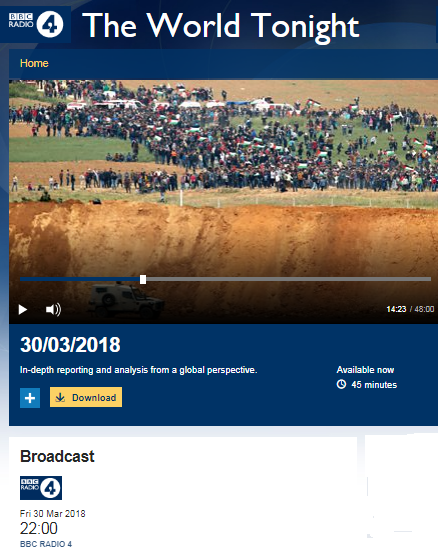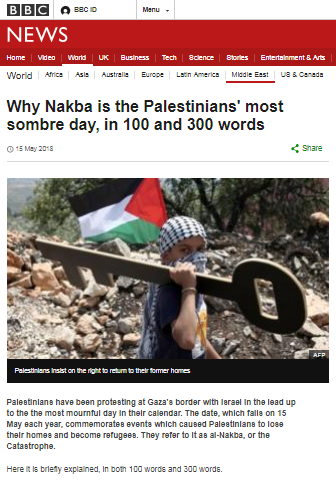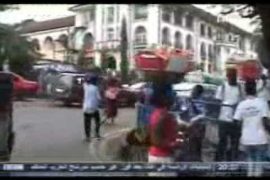In July 2013 the BBC News website produced a backgrounder intended to inform audiences about what it considered to be the five “Core Issues” of negotiations between Israel and the Palestinians: Jerusalem, borders, settlements, refugees and security. Although that backgrounder is no longer available online in its original form, in a section titled ‘refugees’ the Palestinian position was presented thus:
“Formally, they maintain the “right of return”, arguing that without it a great injustice would not be put right. However, there has been regular talk among Palestinians that this “right” could be met by compensation.”
In other words, the BBC presented the Palestinian demand for the ‘right of return’ for refugees as a formality and steered audiences towards the view that the issue would be resolved on a practical level by means of compensation.
Over the past nine months, however, audiences have seen changes in the BBC’s presentation of that topic – primarily but not exclusively in reporting on the ‘Great Return March’ events.
In the BBC News website’s first report on those events on March 30th audiences were told that:
“Palestinians have long demanded their right to return but Israel says they should settle in a future Palestinian state in Gaza and the West Bank.”
The following day visitors to the BBC News website were told that:
“Hundreds were wounded at the start of protests demanding a right for Palestinians to return to former family homes in what is now Israel. […]
The aim of the protest is to assert what Palestinians regard as their right to return to towns and villages from which their families fled, or were driven out, when the state of Israel was created in 1948.”
Listeners to BBC radio 4 on March 30th heard that “Thousands of demonstrators gathered for the start of a six-week campaign for the right to return to homes that are now in Israel” and that “The demonstrators said they wanted to send a clear message that they have a right to return to what used to be Palestinian land: one of the major issues of contention in the Middle East conflict.” [emphasis in bold added]
That programme highlighted one of several issues seen BBC reporting on this topic: the corporation’s failure to challenge deliberate misrepresentation of UN GA resolution 194 by Palestinian interviewees.
On the same day listeners to BBC World Service radio were told that “Thousands of Palestinians massed today in what is the start of weeks of protest to demand that refugees be allowed to return to their homes in what is now Israel” along with yet more misrepresentation of UN GA resolution 194.
However, in early April BBC audiences began to see the use of a new phrase: ‘ancestral lands’. [emphasis in bold added]
“The protesters are demanding that refugees be allowed to return to ancestral lands that are now in Israel.” BBC News website, April 6th 2018
As was noted here at the time:
“One may have thought that BBC editorial guidelines on accuracy and impartiality would have prompted the use of terminology such as “what Palestinians see as their ancestral lands” (particularly seeing as only two years of residency in Mandate Palestine is required to meet the UN definition of refugee) but that was not the case…”
Additional examples of the cross-platform use of that and similar terminology – which is too widespread to be explained by anything other than an editorial decision – include the following:
“The protesters are demanding that refugees be allowed to return to ancestral lands that are now in Israel…” BBC Radio 4, April 6th 2018
“…in similar protests last Friday in support of the demand that Palestinian refugees and their descendants be allowed to return to their ancestral homes in what is now Israel…” BBC World Service radio, April 6th 2018
“Protesters want refugees to be allowed to return to ancestral land now in Israel.” BBC News website, April 13th 2018
“Palestinians want the right to return to their ancestral homes which are now in Israeli territory.” BBC World Service radio, May 9th 2018
“The demonstrations have seen thousands of Palestinians mass on the border in support of the declared right of Palestinian refugees to return to their ancestral homes in what is now Israel.” BBC News website, June 20th 2018
“…mass demonstrations along the border, at which thousands of Palestinians have expressed their support for the declared right of Palestinian refugees to return to their ancestral homes in what is now Israel…” BBC News website, July 17th 2018
“…thousands of Palestinians have expressed their support for the declared right of Palestinian refugees to return to their ancestral homes in what is now Israel.” BBC News website, August 7th 2018
“…protests along the Gaza-Israel border at which thousands have expressed their support for the declared right of Palestinian refugees to return to their ancestral homes in what is now Israel.” BBC News website, August 15th 2018
“The protest campaign expresses support for the declared right of Palestinian refugees to return to their ancestral homes in what is now Israel.” BBC News website, August 28th 2018
“The protests began with a demand for Palestinians to return to their ancestral land that now lies in Israel…” BBC News website, October 1st 2018
“The protesters are demanding an end to the blockade of Gaza by Israel and Egypt and the right to return to Palestinans’ ancestral land which now lies inside Israel.” BBC Radio 4, October 12th 2018
“The protests, orchestrated by the territory’s militant Hamas rulers, are held in support of the declared right of Palestinian refugees to return to their ancestral homes in what is now Israel.” BBC News website, October 25th 2018
“The demonstrations began in March over a declared Palestinian right to return to ancestral homelands from the blockaded Strip.” BBC Radio 4, November 23rd 2018
The term “ancestral land” is of course often used in reference to lands belonging to an indigenous cultural people or community as well as in connection to the place of origin of previous generations. The BBC’s widespread introduction of the non-neutral terms “ancestral lands”, “ancestral homes” and “ancestral homelands” over the past nine months into multiple platform reporting on the topic of the Palestinian demand for ‘right of return’ is hence particularly noteworthy – and all the more so given that audiences were serially denied important background information in the same reports.
Audiences were not provided with adequate context concerning the circumstances under which some of the Arabs living in the area in 1948 became refugees – and not least the fact that the process began because neighbouring Arab states chose to initiate a war intended to eradicate the emerging Jewish state.
None of the BBC’s reports informed audiences that UN GA resolution 194 is non-binding, that it does not specifically relate to Palestinian refugees (despite long-standing BBC claims to that effect) and – contrary to often heard assertions – neither does it grant any unconditional ‘right of return’.
Equally notable is the BBC’s failure in the majority of its reports to adequately explain to audiences why Israel cannot countenance the Palestinian demand for ‘right of return’ and the failure to clarify that the aim of that demand is to threaten the existence of Israel as the Jewish state.
“The Israeli government has long ruled out any right of return…” BBC News website, April 6th 2018
“Israel rejects that demand, saying that it is a threat to its Jewish majority.” BBC World Service radio, May 9th 2018
“Israel says it cannot allow five million refugees to return because this would overwhelm the country of 8.5 million and mean the end of its existence as a Jewish state.” BBC News website, May 15th 2018
“They have very much kept alive this hope of returning back to land which now is inside Israel – something which both Israel and the United States say is unrealistic…” BBC World Service radio, September 1st 2018
Significantly, no effort has been made over the past nine months to explain to BBC audiences that the Palestinian demand for ‘right of return’ is at odds with the two-state solution proposal which the BBC has repeatedly told its audiences in the past is the “declared goal” of “the international community”.
Related Articles:
The BBC’s double helping ‘Nakba’ backgrounder
BACKGROUNDER: The Palestinian Claim to a “Right of Return” (CAMERA)
.



